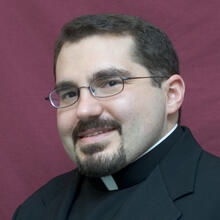To follow Christ, you must renounce your ego.
“If anyone comes to me without hating father and mother and...even his own life, he cannot be my disciple.” This teaching probably perplexed Luke’s audience. Jesus had saved lives, restored individuals to families and communities, and preached a message of hope in eternal life. Could it be possible that he now advocated estrangement and self-annihilation?
ADVERTISEMENT
‘Whoever does not carry his own cross and come after me cannot be my disciple.’
(Lk 14:27)
(Lk 14:27)
LITURGICAL DAY
Twenty-third Sunday in Ordinary Time (C)
READINGS
Wis 9:13-18, Ps 90, Phlm 9-17, Lk 14:25-33
PRAYER
Have you discerned God’s dream for you?
How can you shift your attention from ego to discipleship?
Luke understood this teaching as vital to discipleship. This becomes clear when one compares this passage with Matthew’s version (Mt 10:37-39): “Whoever loves father or mother more than me is not worthy of me…. Whoever finds his life will lose it; and whoever loses his life for my sake will find it.” Matthew allows for love of family and life, as long as love of Christ surpasses it. Luke does not allow for such relativizing.
By emphasizing the phrase “his own life,” Luke highlights what we might today call ego. The things Jesus demands his disciples leave behind are indicators of importance, like family connections, social status and possessions. Striving after these is a temptation in every age, but something in Luke’s own journey of discipleship convinced him that a life built on them was utterly empty.
In Jesus, Luke saw a life of eternal significance. Jesus’ human life was not his own; from the moment of his conception, his existence was a gift from God, and it came with a mission. Jesus came not just to be holy, but to give such an example of holiness that others would long to live the same way. Jesus was perfectly obedient to God’s will. As he taught discipleship, he showed his followers how to do the same.
Discipleship requires one to renounce one’s ego. Accumulating possessions or striving after status and recognition focuses attention on things other than God’s dream. Searching for purpose in “riches, honor and pride,” as St. Ignatius put it, might satisfy briefly, but the inevitable reality of death makes these efforts futile. Most of our ego monuments vanish with our last breath; those that do not fade inexorably into oblivion. Only a life spent pursuing God’s dream, after the example of Christ, will give a human life eternal consequence.
Jesus challenges the crowds to decide at the outset if this is what they want. Much of human culture is not a fulfillment of God’s dream; anyone who follows a divine mission will encounter misunderstanding, hostility and even mortal peril. Calculate, he tells his would-be followers, whether you can afford this. For Luke, the only resource is the Spirit—the active force of divine love that results from faith in the Gospel. Those who are rich in this treasure will succeed in discipleship. Those with no trust in this currency will do better to wait until their faith has strengthened.
Christ issues this same challenge today. A life primarily spent crafting an ego cannot support the demands of discipleship. A life of trust in the Spirit, on the other hand, reflects Jesus’ own fulfillment of God’s dream. Just as Jesus renounced everything and so saved the human race, disciples who fulfill God’s dreams in their own lives will draw others to the same saving power.
ADVERTISEMENT
This article also appeared in print, under the headline "Is This What You Want?," in the September 2, 2019 issue.
THE LATEST FROM AMERICA
A life of true intentionality requires us to seek out the lost and welcome them.
Our faith and struggle continue Christ's work of salvation.
Banquets can be status displays--or a chance to share with those who cannot repay us.
Every heart turned to Christ brings a little more of the fiery divine presence into the world.









No comments:
Post a Comment